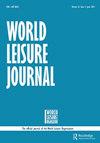The relationship between leisure activities and the mental health of college students during the COVID-19 pandemic
IF 2
Q3 HOSPITALITY, LEISURE, SPORT & TOURISM
引用次数: 2
Abstract
ABSTRACT Despite the benefits of leisure activities for mental health, very little is known about the link between leisure activities and mental health of college students during the COVID-19 pandemic. To fill this knowledge gap, this study sought to examine the relationship between leisure activities and mental health during the COVID-19 pandemic and lockdown. A cross-sectional online survey of 30 Chinese provinces was conducted from March 9 to 25. The Zung’s Self-Rating Anxiety Scale and Self-Rating Depression Scale were conducted to measure mental health, while the duration of leisure activities was used to evaluate leisure. Results of logistic regression showed the impact of leisure activities on self-rated mental health depends on types of leisure activities. Reading and calligraphy are beneficial to self-rated mental health while online activities are not. Self-rated mental health is associated with leisure activities. More college students with self-reported anxiety symptoms like to participate in hobbies and outdoor physical activities, while college students who reported depression are reluctant to participate in most leisure activities. Females, postgraduates incline to participate in more types of leisure activities, and students living in urban areas are reluctant to join outdoor physical activities. Besides, these groups are more likely to have self-reported mental illness symptoms.新冠肺炎疫情期间大学生休闲活动与心理健康的关系
摘要尽管休闲活动对心理健康有好处,但在新冠肺炎大流行期间,人们对休闲活动与大学生心理健康之间的联系知之甚少。为了填补这一知识空白,本研究试图研究新冠肺炎大流行和封锁期间休闲活动与心理健康之间的关系。3月9日至25日,对中国30个省份进行了一项横断面在线调查。采用Zung焦虑自评量表和抑郁自评量量表对心理健康状况进行测量,并以休闲活动的持续时间对休闲状况进行评价。logistic回归结果表明,休闲活动对自评心理健康的影响取决于休闲活动的类型。阅读和书法有利于自我评价的心理健康,而网络活动则不然。自我评定的心理健康与休闲活动有关。更多有自我报告焦虑症状的大学生喜欢参加业余爱好和户外体育活动,而报告抑郁的大学生不愿意参加大多数休闲活动。女性、研究生倾向于参加更多类型的休闲活动,而生活在城市地区的学生则不愿意参加户外体育活动。此外,这些群体更有可能出现自我报告的精神疾病症状。
本文章由计算机程序翻译,如有差异,请以英文原文为准。
求助全文
约1分钟内获得全文
求助全文
来源期刊

World Leisure Journal
HOSPITALITY, LEISURE, SPORT & TOURISM-
CiteScore
3.10
自引率
6.20%
发文量
34
期刊介绍:
As the official journal of the World Leisure Organisation, the purpose of the World Leisure Journal is to stimulate and communicate research, theory, and critical thought in all areas that address leisure, including play, recreation, the arts and culture, sport, festivals, events and celebrations, health and fitness, and travel and tourism. Empirical and theoretical manuscripts, as well as position papers, review articles, and critical essays are published in the World Leisure Journal . The World Leisure Journal is international in scope, and encourages submissions from authors from all areas of the world. Comparative cross-national and cross-cultural research reports are especially welcome. For empirical papers, all types of research methods are appropriate and the subject matter in papers may be addressed from perspectives derived from the social, behavioural, and biological sciences, education, and the humanities. Both pure and applied research reports are appropriate for publication in the World Leisure Journal . In addition to original research reports and review essays, book reviews, research notes, comments, and methodological contributions are appropriate for publication in the World Leisure Journal .
 求助内容:
求助内容: 应助结果提醒方式:
应助结果提醒方式:


